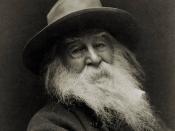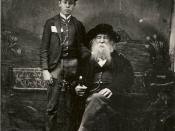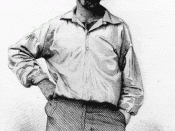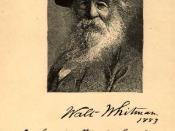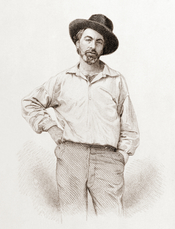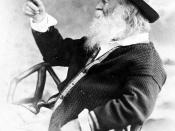Grass Grows In his book, Leaves of Grass, Walt Whitman describes his connection with nature and the environment that surrounds him. He also emphasizes how he can empathize with everyone by claiming that he is part of everyone and everyone is a part of him. Whitman also presents the idea of immortality and how it is attained. Whitman describes grass as something of a supernatural essence, as products of death, and as leaves, or pages, of a book, to emphasize the sense that grass represents immortality.
One of Whitman's most recognizable talents is the ability to establish a connection between something small and something vast. Whitman does this several times with grass. ""æI guess [grass] is the handkerchief of the Lord,/A scented gift and remembrancer designedly dropped,/ Bearing the owner's name someway in the corners, that we may see/ and remark, and say Whose"à(29). Whitman takes the reader from a blade of grass to God, the creator.
God created the Earth and when He did, he left "proof"àthat He created the Earth by leaving his "signature;"àgrass. Whitman also describes the grass as children. ""æ[T]he grass is itself a child"æ.the produced babe of the/vegetation"à(29). "Mother"àEarth yields grass, or, in this case, "children."àOnce again, Whitman makes the reader's mind travel from a blade of grass, to the face of the Earth. The greatest of all transitions from small to vast is the connection Whitman establishes between the grass and stars. "I believe a leaf of grass is no less than the journeywork of the stars"à(55). Within a line, Whitman succeeds in moving from a small, rather insignificant object, to a grand one. Whitman brings grass to the same level as the Earth, the stars, and even God, all of which represent some degree of immortality, thus resolving that grass represents immortality.
As well as using a magnifying technique, Whitman also gives grass a sense of immortality by using morbid descriptions that also deal with the life cycle that includes death. For example, when people die, their corpses provide nutrients to the soil , which can then yield grass. Another example of his use of a cycle is when he talks about the return of life after death. "The smallest sprout shows there is really no death,/And if there ever was it led forward to life, and does not wait at the/end to arrest it,/And ceased the moment life disappeared"ÃÂ (30). Again, Whitman emphasizes the immortality of grass, as it springs from death in sprouts and new forms of life in a never-ending cycle.
As well as describing grass to emphasize an immortal cycle of life and death, Whitman also describes grass as a collection of man's thoughts. "These are the thoughts of all men in all ages and lands"æ[t]his is the grass that grows wherever the land is and water is"æ"à(41). The leaves of grass are the leaves of books which carry man's voice and allow man to live forever among the pages. Whitman also takes it to a personal level. "I bequeath myself to the dirt to grow from the grass I love,/If you want me again look for me under your bootsoles"à(86). Again, he emphasizes the life and death cycle. He becomes the corpse in the Earth that provides the nourishment for the grass. He becomes immortal because he becomes part of the grass; part of nature. He lives on in the "leaves"àof his book. By way of the leaves of grass, Whitman becomes immortal.
Grass, the product of death, the leaves of a book, gives Whitman a way to ensure his immortality. By writing on pages, he leaves his voice to live on forever in his writing. His becomes absorbed by the Earth from whence it originated (according to the Bible; "ashes to ashes, dust to dust"ÃÂ) to yield fresh life in the form of grass. Walt Whitman succeeded, as he is immortal in Leaves of Grass.
